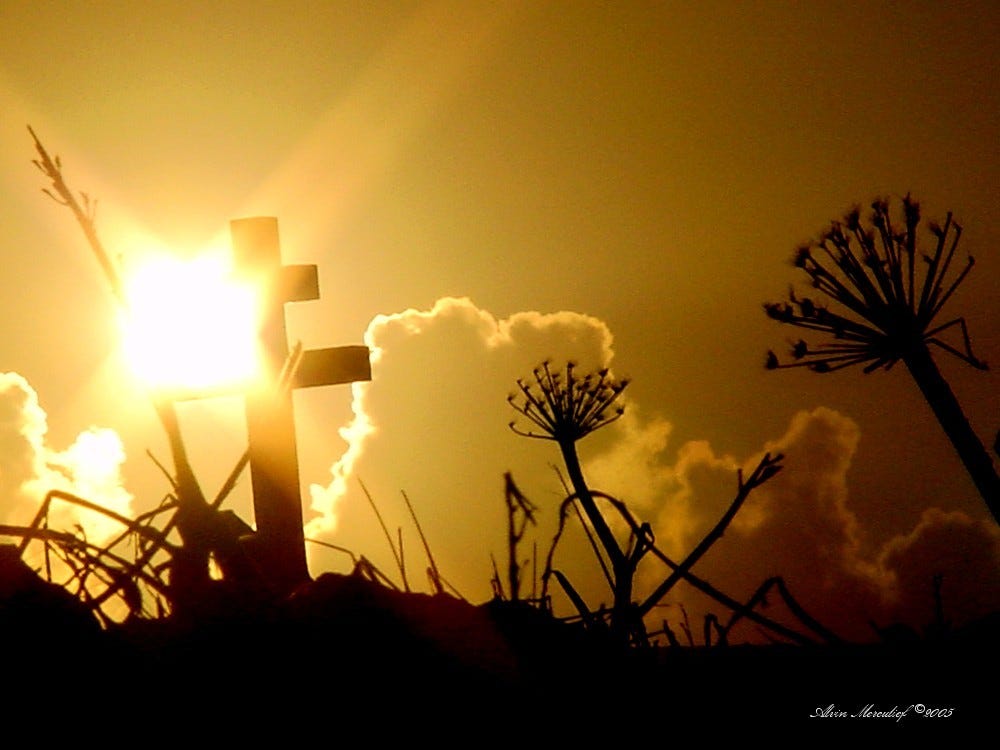Throughout history and across culture, women are often the ones washing dead bodies, keeping watch before burials, feeding the mourning, ministering in the wake of death.
So too Jesus’ women have, in the hours before dawn, prepared age-old recipes of grief-scented spices. They didn’t know how they were going to roll away that heavy stone, but they leave with the sunrise anyway.
I wonder if, as they hurried through the quiet, ephemeral beauty of early dawn, anticipation threaded their weeping or if they dragged their steps to make time slow down.
This was it. The final moment. They would get to see His body once last time.
I wonder if in later years the aroma of those same spices that once fragranced their oil infused hands would bring it all back to mind, the way scents can instantly transport us to a poignant memory.
Because this moment was unforgettable. The earth violently shook.
It was a Marvel-esque result of the Angel of the Lord descending and rolling back the stone: appearance like blinding lightning coming so soon after the darkened sun and earthquake days before – no wonder the guards were shaken by fear.
I wonder if they fainted or just played dead
But the women were conscious. Aware. And brave.
It’s unclear if, when they set out that morning, the women knew the tomb was guarded by Roman soldiers.
But the Marys had been at the cross. They knew the brutality of Rome and the political stakes.
These women didn’t faint.
They listened to the Angel’s message. I wonder if they were in shock, if their world moved in slow motion, hyper-focused on every syllable.
What is it like to have your waves of grief rolled back with such unbelievable incomprehensible news?
But they do believe it. Instantly. No questions asked.
Days earlier, Mary, sister of a man Jesus had raised from death, had anointed His feet for burial. I wonder why. Did she know He was heading toward death?
She *had* spent a lot of time sitting at His feet, listening to His words.
Maybe like her, these women at the tomb, had been paying attention to Jesus’ words. Maybe they had a hint of resurrection hope. They knew Jesus had raised a man stone-cold-4-days-dead.
I wonder if they held their breath as they drew near the tomb, hoping for the impossible. The text doesn’t say.
The women who arrive Easter morning are the same women who were sitting at the tomb after Joseph of Arimathea had first, in his own gentle ministrations, placed Jesus there. These women had followed Jesus and ministered to Him. They were determined to minister to Him still.
And then they RUN to tell the others the news.
Can you imagine? The perfume of forgotten and discarded spices filling the air, the scent of grief displaced with great joy: they sprint. Any woman who has worn layered garments knows what this is like: Hoisted cloth. Awkward pacing. They run.
The scene could’ve ended here. The Angel had delivered the message. Everyone would soon know Jesus was alive. Indeed, Jesus would later appear to many.
But in Matt 28:9-10, Jesus Himself meets these women as they are on their way to tell the others. Unnecessarily. Profligately. Redundantly. I wonder why He does this?
What do you think?
Can it be that He simply wanted to see them?
That He missed them?
That He longed to be reunited with His dear friends and say: You Guys, I did it! It is finished!
That He loved them?
There are ways to explore this by attempting to harmonize the Gospels, but there are still gaps for our imaginations, and I love that. One thing is clear: Jesus often went to extraordinary lengths to have encounters with individuals.
It was no accident that He met them there. I wonder if the brothers ever regretted missing this moment, if they wished they had kept watch with the women or braved that early trek to the soldier-guarded tomb.
Jesus doesn’t forget His brothers. He instructs the women to let them know Jesus will meet them all in Galilee. The angel makes sure to include Peter, a poignant kindness for the disciple who wept at the rooster’s crowing. But first He says to the women: “Don’t be afraid.”
I wonder what they were afraid of in that moment.
Not death, certainly, for any closely held hopes they might have nurtured as they kept watch through the long night had blossomed into reality: death had no power.
Was it an overwhelming somatic response that left them, as Mark says, trembling and bewildered? Did they fear to let Jesus out of their sight? Or were they afraid of the soldiers? Or of the brothers?
Because the brothers don’t believe them.
Luke tells us that the women’s words “seemed like nonsense” to the other followers of Jesus.
Sometimes people don’t want to listen to women.
A few do. Peter and John race each other to the tomb to see for themselves. (John wants us to know he’s fastest & I love him for it). I don’t know why the women were afraid, but maybe in leaving that unspecified, as is often the case in Scripture, we are invited to consider the life-giving words for ourselves.
There are many things to fear in this in-between time where we do not yet see Jesus with our own eyes
“Don’t be afraid,” Jesus says to the women and, maybe, to His other followers – to the brothers…and perhaps even to us.
In the waiting of His absence, there is work to be done, tasks entrusted to us, and then, at some future date?
We all will see Him there.
Blessed Holy Week, friends!









“Grief-scented spices” is a great turn of phrase.
Beautiful. Thank you!